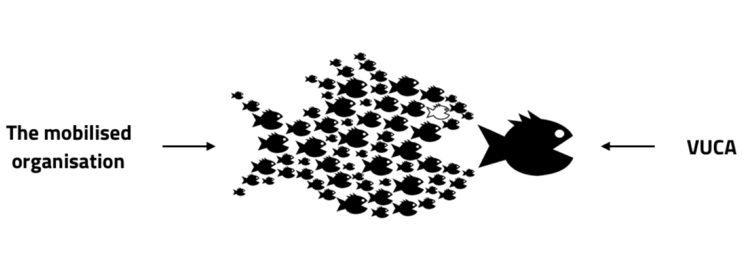Listen now to Candice’s article: The Mobilised Organisation
“Irrelevance happens when the speed of change outside of an organisation is greater than the speed of change within an organisation.”– Rick Warren
We live during a time where everything that can be changed, will be changed; from the way we work to the way we live our day-to-day lives.
Our interconnected and globalised world, with access to information and rapidly emerging and disrupting technology, creates a landscape for businesses that requires some soul searching to determine how to consistently add value, and remain relevant, in such a volatile, uncertain, complex and ambiguous (VUCA) environment.

Expectations from consumers, employees, and communities are shifting in ways that require organisations to look beyond just achieving their bottom line, to how the organisation goes about doing it in consideration of the environment, people, and communities they serve.
Organisations who wish to remain relevant and competitive in the years to come must not only be adept at responding to change, but also consciously lead change.
While none of us can predict the future, many businesses are looking to establish ways to build organisational cultures and structures that are future-proof. Much of the focus has been on agility – that is, creating organisations that can respond to change. But organisations who wish to remain relevant and competitive in the years to come must not only be adept at responding to change, but also consciously lead change.
Before I started my career in Talent Management and the for-profit world, I spent a number of years working with social change organisations. I worked with organisations who used grassroots and community organising principles to build meaningful and positive change in local communities and around the world. One thing that always struck me about this work was the amount of passion, care, organisation, and emphasis on empowering every person involved to take action.
Effective grassroots movements are built to win, inspire action, create unity around a common goal, and make a difference. They’re designed to be purpose-driven, liberating environments where everyone can lead in a way that uniquely connects them to the mission. As businesses continue to work towards building future-proof organisations, I believe there are key principles that companies can learn from the experts of people and grassroots mobilisation to build winning organisational cultures. The following are some of the principles organisations can adopt.
Be the change
It would be difficult to benefit from the power of grassroots mobilisation without having an authentic and compelling purpose that is also tied to social impact. I interviewed many non-violent direct-action grassroots organisers and during those interviews, I discovered that each organiser was drawn to making a positive difference. Each of their stories started off with an ability to recognise issues and a compelling desire to do something about them. The organisers viewed themselves as change agents, or change enablers, who were “activated” by their willingness to make the world a better place for current and future generations. They did not view their work as temporary or fleeting, but as a lifelong commitment. And what got them to this level of dedication was always a compelling mission that inspired them to keep going.
Application: Find a social issue that aligns authentically with the mission of your organisation. While volunteering and donations are great, organisations have to take it a step further by being the change they want to see. This means finding authentic opportunities within all of your organisational practices and processes to impact change. The UN’s Global Goals is a great place to start to identify social challenges.
During onboarding, have employees set their personal mission within your mission. What’s important to them? How will being a member of this organisation support their goals? What do they want their legacy to be?
Build people power
As a leader in developing human potential, one of my favourite aspects about grassroots mobilisation is the belief in people power. Grassroots organisers take on a facilitative leadership process. They believe that real and lasting change happens when people are empowered to act and work on behalf of their own self-interests. Development is an extremely important pillar of this work, as everyone is given tools to not only lead change and take charge, but respond to challenges and obstacles that may arise.
One of my favourite aspects about grassroots mobilisation is the belief in people power. Grassroots organisers take on a facilitative leadership process.
Application: Leverage innovative learning technology, tools, and programmes to equip everyone with the knowledge and resources they need to succeed. Provide universal skills such as effective communication, systems thinking, continuous improvement, project management or finance education to all employees. These are skills that will not only empower them to succeed and add value to customers in a mobilised organisation, but also succeed in their personal lives. Build a transparent and grassroots career development process – allowing employees to build and visualise their future within your organisation.
Remove barriers to participation
There is no agility or innovation within oppressive, rigid and confining structures. Often, organisations are structured in ways that promote groupthink, low psychological safety, silos, exclusion based on differences, and an over-reliance on the status quo. We amplify and recycle the same voices and perspectives, and miss out on answers and solutions that are available to us. We often miss the full scope of the experiences and untapped talent we have within our own organisations.
Application: Remove barriers to participation by mapping out and understanding the experiences of your employees through their lens. Is everyone experiencing the same organisation? Do people feel safe being their authentic selves? Do they feel that their voices, experiences, and perspectives are valued within the organisation? Design interventions based on your findings to build a culture of inclusion, empowerment and openness. Co-create solutions with the workforce. Bring people along for the journey. Host skip-level meetings and find ways to continuously break processes, thoughts, and actions that prevent people from reaching their highest potential.
Develop ally leadership
In social change movements, an ally is an important form of support. An ally is someone who may not experience the challenges of a particular social group but is committed to using their influence and impact to learn, educate others, and support the work of the impacted group.
Application: Leaders should study the role of an ally in social movements to adopt practices that will empower and enhance the lives of their staff, customers and communities. How can you use your influence, impact and privilege as a leader to support your direct reports and customers?
*
When all that we can be certain of is that things will remain uncertain, we must become comfortable with adapting quickly – it’s the only way to stay relevant. A mobilised organisation, based on the principles and practices of grassroots movements, allows businesses to do this. By weaving authentic purpose into everything they do, building capacity through employees and the communities they serve, and removing barriers to participation, organisations can consciously lead the change – and successfully lead the charge.













































